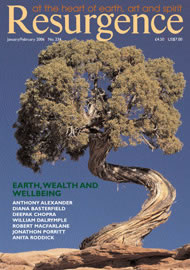THE REFORM OF the European Common Agricultural Policy (CAP) is a matter of urgency. Not only for economic reasons, but more importantly for environmental, social, spiritual and health reasons. The British Prime Minister, Tony Blair, is proposing to reform the CAP mostly as a means to save money, which is a trivial reason. Fundamentally, industrial agriculture is dependent on the excessive use of fossil fuels and heavy machinery, which in turn contribute to global warming. Therefore CAP reform must include the reduction of petroleum use and increase human participation in the production of food.
Industrial agriculture removes people from the land and disconnects them from the very source of food upon which we all depend. During the 20th century, due to the availability of cheap oil, we came to believe that mechanised agriculture is an advanced form of farming and that human connection with the land is not only a backward method, but also unnecessary.
Moreover, industrial societies are obsessed with the idea of economic growth at all costs. For them, economic growth is a sign of progress. And they have come to believe that globalisation is the most efficient way of achieving economic growth. As a result, mass production and mass transportation of food around the world have become normal practice. 60% of world travel by air, land or sea is for the purpose of business and only 40% is for the purpose of family, friendship, leisure and pleasure. Thus globalisation is a major cause of global warming.
So, if political and business leaders want to maintain industrial agriculture and the global distribution of food on the one hand and combat global warming on the other, there is clearly a contradiction. Industrial farming methods and mass transportation are inevitably destructive to the environment. Christopher Lloyd in his article is asking European nations to embrace organic farming, protect small and family farms, promote local distribution and consumption of food and encourage the participation of a greater number of people in food production, through reform of the CAP.
Through our education, media and policy decisions we have been conditioned to think that working on the land is unpleasant work, and that it is dirty and worthless, whereas sitting in front of a computer in an office, shifting papers, attending meetings, administration and management are easy, clean work, and worth more. This conditioning of the mind has resulted in a fear of and aversion to outdoor work. We are frightened of the rain, wind and cold. We are frightened of wasps, worms, bees, beetles, slugs and spiders. We are frightened of the wild and unpredictable. This is a very industrial mindset. Agrarian societies of Asia, Africa and South America do not fear the wild; rather, they embrace it. We in the West need to cultivate a love of the outdoors, the wild and the natural.
This has to begin early in life. Children in primary schools and secondary schools as well as students of universities should be given the opportunity to participate in gardening and human-scale farming so that they become familiar with the natural world. If every school can have a playground, why can it not also have a garden?
In Benedictine monasteries, gardening and farming are considered a spiritual practice. Many gardeners and farmers around the world find that their connection with the soil is a source of spiritual health and joy. A new movement in Europe is emerging. It is called Green Care. At Green Care farms, mental and physical health are promoted by inviting people to spend time working on and enjoying the land. Jules Pretty in his column informs us that in Norway there are 500 such farms and that the movement is spreading throughout the Netherlands, Italy, Germany, Austria and Belgium - but not in the UK. Why not? Perhaps reform of the CAP could support and promote such an initiative.








